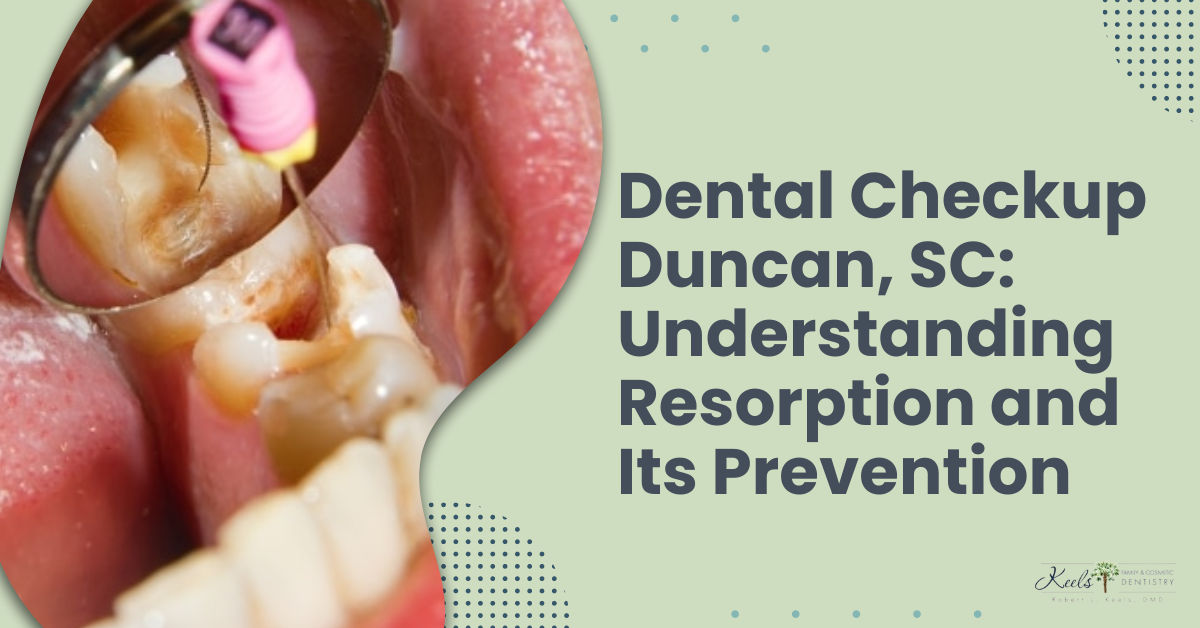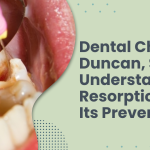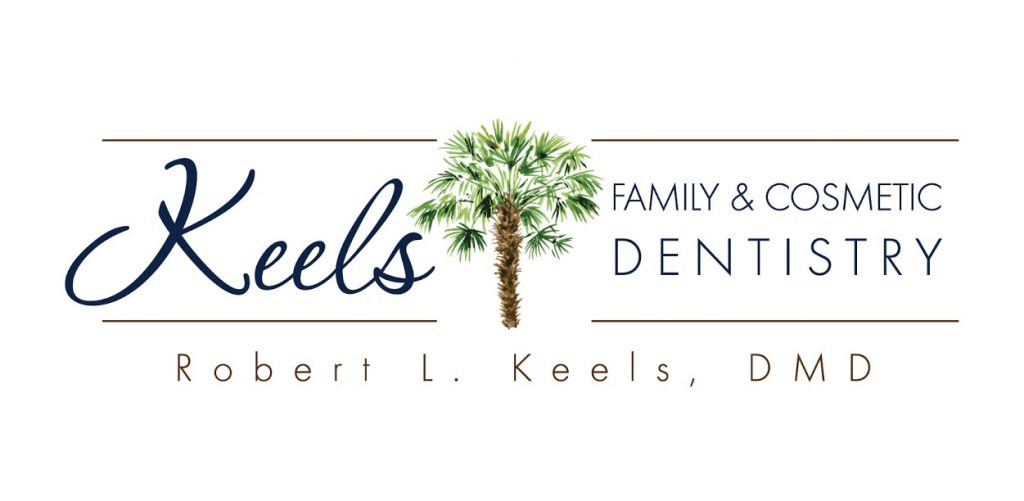Regular dental checkups are crucial for maintaining good oral health, and if you're in Duncan, SC, understanding conditions like resorption can help you take better care of your teeth.
Resorption is a process where the body's cells break down and absorb the tissues around the teeth, potentially leading to serious dental issues. During a checkup, your dentist can identify early signs of resorption and guide how to prevent it. Simple steps like maintaining good oral hygiene, addressing any trauma to your teeth promptly, and having regular dental visits can make a big difference.
By staying informed and proactive, you can ensure your smile stays healthy and strong for years to come. Remember, your dentist is your ally in keeping your teeth in top shape, so don't hesitate to ask questions and follow their advice.
What Factors Contribute to Dental Resorption, and How Does It Affect Oral Health?
Various factors contribute to this condition, making it essential to understand its causes and effects.
- Trauma: Injuries to the teeth or jaw can trigger resorption, leading to damage over time.
- Orthodontic Treatment: Braces and other orthodontic devices can sometimes cause pressure that leads to resorption.
- Inflammation and Infection: Chronic inflammation or infection in the gums or surrounding tissue can promote resorption.
- Genetic Predisposition: Some individuals are more prone to resorption due to genetic factors.
- Systemic Diseases: Conditions like hyperparathyroidism or Paget’s disease can increase the risk of dental resorption.
- Tooth Reimplantation: Teeth that have been knocked out and reimplanted can be more susceptible to resorption.
Effects on Oral Health
- Tooth Weakness: Resorption can weaken the structure of the tooth, making it more prone to damage.
- Tooth Loss: In severe cases, resorption can lead to the loss of affected teeth.
- Pain and Discomfort: Patients may experience pain, sensitivity, or discomfort as the condition progresses.
- Aesthetic Concerns: Resorption can affect the appearance of teeth, leading to cosmetic issues.
Understanding the factors that contribute to dental resorption and its effects on oral health is crucial for prevention and management. Awareness and proactive dental care can help mitigate the risks and maintain a healthy smile.
Can Resorption Be Prevented Through Routine Dental Checkups, and What Role Does Early Detection Play?
Routine dental checkups are vital for maintaining oral health, and they play a crucial role in preventing and managing dental resorption. Early detection through these checkups can make a significant difference in outcomes.
- Regular Monitoring: Routine checkups allow dentists to monitor any changes in the teeth and gums that could indicate early signs of resorption.
- Professional Cleanings: Regular cleanings help remove plaque and tartar, reducing the risk of inflammation and infection.
- Early Detection: Identifying resorption early can lead to more effective treatment and better outcomes.
- Preventive Advice: Dentists can guide on preventing resorption, such as maintaining good oral hygiene and addressing dental trauma promptly.
- Customized Treatment Plans: Regular visits enable dentists to develop and adjust treatment plans tailored to the patient's needs.
Role of Early Detection
- Minimizes Damage: Catching resorption early helps minimize the extent of damage to the teeth.
- Less Invasive Treatments: Early-stage resorption can often be managed with less invasive treatments compared to advanced cases.
- Preserve Oral Health: Preventing the progression of resorption helps preserve overall oral health and function.
- Reduces Costs: Early treatment can be less costly than addressing more severe damage later on.
- Improves Prognosis: Patients have a better chance of maintaining their natural teeth with early intervention.
Routine dental checkups are essential for preventing and managing dental resorption. Early detection through regular visits allows for timely and effective treatment, helping patients maintain healthy and strong teeth.
What Are the Common Symptoms of Dental Resorption That Patients in Duncan, SC Should Be Aware Of?
Recognizing the symptoms of dental resorption is key to seeking timely treatment and preventing severe dental issues. Being aware of these signs can help patients in Duncan, SC, take proactive steps in managing their oral health.
- Tooth Pain: Persistent or intermittent tooth pain can be an early sign of resorption.
- Sensitivity: Increased sensitivity to hot or cold foods and drinks might indicate resorption.
- Swelling: Swelling in the gums or around the affected tooth can occur.
- Color Changes: The tooth may appear darker or more translucent if resorption is occurring.
- Loose Teeth: Teeth that feel loose or unstable can be a symptom of advanced resorption.
- Visible Damage: Chips, cracks, or other visible damage to the tooth may be a sign.
Detailed Symptoms
- Discomfort When Chewing: Pain or discomfort while chewing can indicate resorption.
- Gum Irritation: Irritated or inflamed gums around the affected tooth may occur.
- Unexplained Bleeding: Bleeding gums without apparent cause can be a warning sign.
- Odd Sensations: Tingling or strange sensations in the affected tooth might be experienced.
Being aware of the common symptoms of dental resorption can help patients in Duncan, SC seek timely dental care. Early recognition and treatment are crucial in preventing more serious dental problems.
How Do Dentists in Duncan, SC Typically Diagnose and Treat Cases of Dental Resorption During Routine Checkups?
Dental resorption requires accurate diagnosis and appropriate treatment to manage effectively. Dentists in Duncan, SC use various techniques during routine checkups to identify and address this condition.
- Visual Examination: Dentists conduct a thorough visual inspection of the teeth and gums.
- X-rays: Dental X-rays are crucial for detecting internal resorption not visible during a visual exam.
- CBCT Scans: Cone-beam computed tomography (CBCT) scans provide detailed images of the tooth structure.
- Patient History: Understanding the patient’s dental and medical history helps identify potential risk factors.
- Sensitivity Tests: Tests to assess tooth sensitivity can help identify affected areas.
- Periodontal Probing: Probing around the tooth can detect areas of attachment loss or bone resorption.
Treatment Options
- Monitoring: In the early stages, dentists might recommend monitoring the condition with regular checkups.
- Restorative Procedures: Fillings, crowns, or other restorative procedures can repair damaged teeth.
- Root Canal Therapy: For internal resorption, root canal therapy might be necessary to remove the affected tissue.
- Extraction: In severe cases, extracting the affected tooth may be the best option to prevent further damage.
- Preventive Measures: Dentists guide preventive measures to avoid further resorption.
Dentists in Duncan, SC use a combination of diagnostic tools and treatment options to manage dental resorption effectively. Regular checkups and early intervention are key to preserving oral health and preventing severe complications.
Understanding dental resorption and its impact on oral health is essential for maintaining a healthy smile. Regular dental checkups play a crucial role in early detection and prevention, helping to minimize the damage and ensure timely treatment. By being aware of the symptoms and seeking prompt care, patients can protect their teeth and overall oral health.
Schedule Your Dental Checkup Today!
At Keels Family & Cosmetic Dentistry, we are committed to providing top-quality dental care to help you maintain a healthy and beautiful smile. Our experienced team uses the latest diagnostic tools and treatment techniques to manage dental resorption and other oral health issues effectively.
Don’t wait until it’s too late—schedule your routine dental checkup with us today and take the first step towards preventing dental resorption. Contact Keels Family & Cosmetic Dentistry in Duncan, SC to book your appointment now. Your smile deserves the best care!


